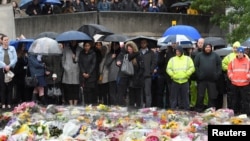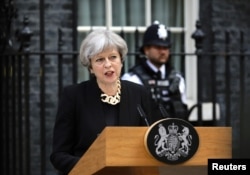British Prime Minister Theresa May is being forced to defend her past record as the country’s interior minister, and the political architect of Britain’s counter-terror system, as more details emerge of the three attackers and what security agencies knew about them before their van-and-knife rampage Saturday in the heart of London.
Ahead of Thursday's vote in a snap post-Brexit parliamentary election, which May called with the expectation of securing a landslide victory, the terror attack is undermining the air of dogged competence May carefully crafted as the country's home secretary, a post she held for six years and relinquished on becoming prime minister last year.
Foreign Minister Boris Johnson conceded Tuesday that there were questions to answer about how the three militants slipped through the intelligence net. He was speaking as police named the third attacker as 22-year-old Italian-Moroccan Youssef Zaghba, who was on an Italian watchlist and suspected of being a foreign fighter.
Born in Fez, Morocco, in 1995 to an Italian mother and a Moroccan father, Zaghba was stopped by Italian police at the Bologna airport on March 15 of last year after arousing suspicions he was going to join the Islamic State terror group to fight in Syria.
Italian officials say he had a one-way ticket to Istanbul and was carrying just a small backpack. His cell phone, which was seized, contained jihadist content, including pictures and videos, and he was placed on a watchlist as a suspected foreign fighter. Italian officials say they shared intelligence on him with both the British and Moroccan security agencies.
Lived in Britain
The last few years Zaghba lived in Britain, where he worked on and off at a restaurant and a hotel near Regents Park, traveling back and forth to visit his mother, who lives in Bologna.
The naming of the third Islamic militant came after it emerged earlier Tuesday that the ringleader of Saturday’s attack, 27-year-old British-Pakistani Khuram Shazad Butt worked for a man accused of helping to train the Islamic extremists responsible for the July 7, 2005 underground train bombings in London, Britain’s first Islamist suicide attack. Fifty-two people were killed across Britain’s capital in the coordinated strike and more than 700 others were injured.
Counterterror analysts say they are surprised that Butt remained a "low priority" for the security services despite his close connections to Sajeel Shahid, a 41-year-old who ran an all-Muslin gym in east London and was named in a New York court case as having helped to set up weapons training in Pakistan for the July 7 suicide bombers.
“It was a blunder to have downgraded the terror threat in Britain so quickly after the Manchester bombing,” said Olivier Guitta, managing director at GlobalStrat, a security and geopolitical risk firm. He says with election campaigning under way coinciding with Ramadan, the Muslim holy month, the chances of attacks were always high.
Guitta, who has advised government in the past on counterterrorism, said, “No one should be surprised by the terrorism wave and which is linked to a policy of laissez-faire policy toward extremists.”
The main charge leveled against May by Labour politicians and the leaders of the country’s smaller parties is the large cuts she introduced on funding for Britain’s police. Those cuts resulted in police personnel being drawn down from 2010 to 2016 by more than 20,000 officers.
Uncertain election impact
On Monday, the opposition parties received support for their criticism from an unlikely quarter. Conservative insider Steve Hilton, the policy guru of former Prime Minister David Cameron, demanded May resign over what he termed “security failures,” which he said led to Saturday’s attack and the bombing of a concert last month in Manchester.
He said May should be “resigning, not seeking re-election.”
Pollsters are wary of predicting how the terrorist attacks — three in the past 10 weeks — will impact the voting on Thursday, but Labour leaders say they have renewed hope at the very least of reducing the ruling Conservative’s majority as they seek to recast their campaign message in the final hours before voting as “investment versus cuts.”
On Sunday, May promised to review Britain's counterterrorism strategy, holding out the prospect of enhanced powers for the security services and longer prison sentences for extremists. May said she wants to take a tougher line with internet providers and social media businesses that allow extremist material on their sites.
She warned there has been “far too much tolerance of extremism” in Britain and promised to step up the fight against Islamist terrorism after the London Bridge attack, saying “enough is enough.”
British counterterror chiefs say that while Butt was investigated in 2015, he was deemed a low risk. According to Assistant Police Commissioner Mark Rowley, he had seen “nothing to show that a poor decision has been made” in 2015 and that police had no evidence Butt was planning anything.
Police, however, confirm they received several warnings from neighbors and associates about Butt.
British police and MI5 set up in 2013 an early warning system, known as Project Danube, to help them spot when low-priority suspects might be re-engaging in violent extremism. That program appears to have failed, say critics, as it did not help them identify Khalid Masood, the militant responsible for the Westminster Bridge attack in March that killed five people. Nor did it alert them to the Manchester Arena bomber, British-Libyan Salman Abedi.








